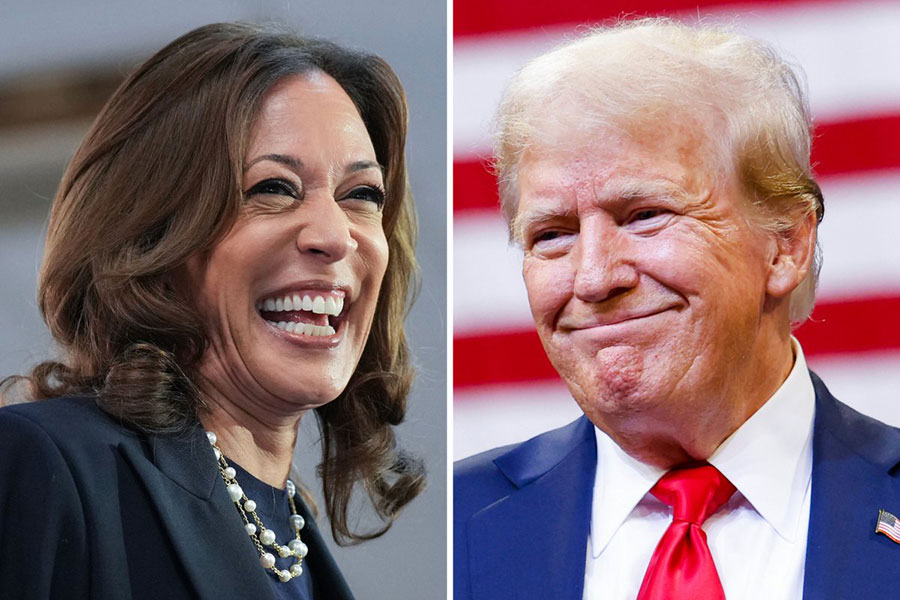Many are curious about how the future of US foreign policy may change, depending on whether Kamala Harris or Donald Trump wins the presidential election. Some believe Harris’s approach will closely mirror Joe Biden’s, focusing on ongoing support for Ukraine, strengthening NATO relations, and maintaining pressure on Russia and China. In contrast, others argue that a Trump presidency would resemble his previous term, featuring pressure on NATO, limited engagement in international matters except for select priorities, steadfast support for Israel, pressure on Iran, and shifts in relations with Russia and China. However, our focus is on the implications for US foreign policy in the South Caucasus, particularly regarding Armenia, under either Harris or Trump.
On July 21, US President Biden announced his withdrawal from the presidential race, and endorsed Kamala Harris as the Democratic Party’s nominee. Biden became the third president in USA history to have followed such a course of action. The other two acting presidents who had previously decided not to pursue another term as presidents were the 33rd president, Harry S. Truman, and the 36th president, Lyndon B. Johnson.
Read also
The US presidential elections are consequential for US foreign policy and the whole world. Thus, Biden’s decision is going to inevitably influence the future of US foreign policy. Aside from Harris and Trump, there is a third independent contender for the presidency – activist-lawyer Robert F. Kennedy Jr. He can cause some problems for both Trump and Kamala by winning important ballots in swing states where his mere thousands of votes can change the outcome of the swing state votes and ultimately impact the result of the presidential elections. But still, the main battle is going to be between the former two. And whichever one is elected, one thing is certain: the trajectory of US foreign policy is going to undergo some change. As a consequence, US foreign policy towards the South Caucasus region will also change.

Suren Sargsyan
Firstly, under the Biden administration, the US assumed the role of an active mediator to regulate Armenian-Azerbaijani relations and actively encourage the settlement of Armenian-Turkish relations. However, this approach is not new, as all the US administrations, starting from George H.W. Bush administration, have pursued an active policy for the regulation of Armenian-Turkish and Armenian-Azerbaijani relations. One thing that is significantly different now is that Armenia is ready to make unilateral concessions, something that previously has not happened under any other president. This has also opened a new window of opportunity for the US to reduce Russia’s influence through the settlement of conflicts in the South Caucasus. Hence, we observed a much more active US involvement in the region.
As for Kamala Harris, it should be noted that she actively cooperated with Armenian lobbyists during her years as a senator and supported some pro-Armenian initiatives. In 2019 and 2020 Kamala Harris signed the letters supporting Artsakh de-mining, in 2020 she signed a letter to the Library of Congress urging them to properly categorize the Armenian Genocide, and she issued an April 24th statement marking the Armenian Genocide in 2019/2020. At the same time, Harris did not cosponsor or support the Azerbaijan human rights / arms ban resolution, did not cosponsor the Turkey human rights / arms ban resolution and did not sign the 2020 statement condemning Azerbaijan/Turkey attacks on Armenia/Artsakh. Despite the fact that she was a senator representing California, she had never stood out for her active pro-Armenian initiatives.
To understand what Harris’s foreign policy will be in case she becomes the new US President, one should keep in mind that she does not have much experience in foreign policy and is going to rely mostly on the opinions of her advisors, unlike President Biden, who had extensive experience and knowledge about US foreign policy and international relations in general.
In the case of Trump’s victory, the settlement of Armenian-Azerbaijani and Armenian-Turkish relations will be pushed back and a certain passivity will ensue. We have observed Trump’s foreign policy unfold until 2021, including the 44-day war in Nagorno-Karabakh. Trump took a rather passive stance, limiting himself to a couple of tweets and statements that did not entail concrete steps toward the resolution of the conflict. The only significant engagement in this war by the Trump administration was the meeting between his National Security Advisor and the Armenian community, as well as the third ceasefire between Armenia and Azerbaijan brokered by the USA which did not last long. There was no other substantial involvement by the Trump administration and there is no reason to think this will change during his second tenure.
There is a possibility that he will once again adopt a somewhat isolationist policy. Similar to his initial years in office, Trump is likely to prioritize addressing critical issues vital to the US, such as concerning the Middle East, resolving the conflict in Ukraine, and clarifying relations with China. Taking into account the high probability that Trump will seek to regulate relations with Russia and end the Russian-Ukrainian war, it means that Russia will start taking more active steps in the South Caucasus, including taking over the role of the main mediator in the settlement of the Armenian-Azerbaijani conflict.
In sum, regardless of the outcome of these elections, whether current Vice President Kamala Harris or former President Donald Trump is the winner, active US policy towards Armenia will decline to a certain extent.




















































